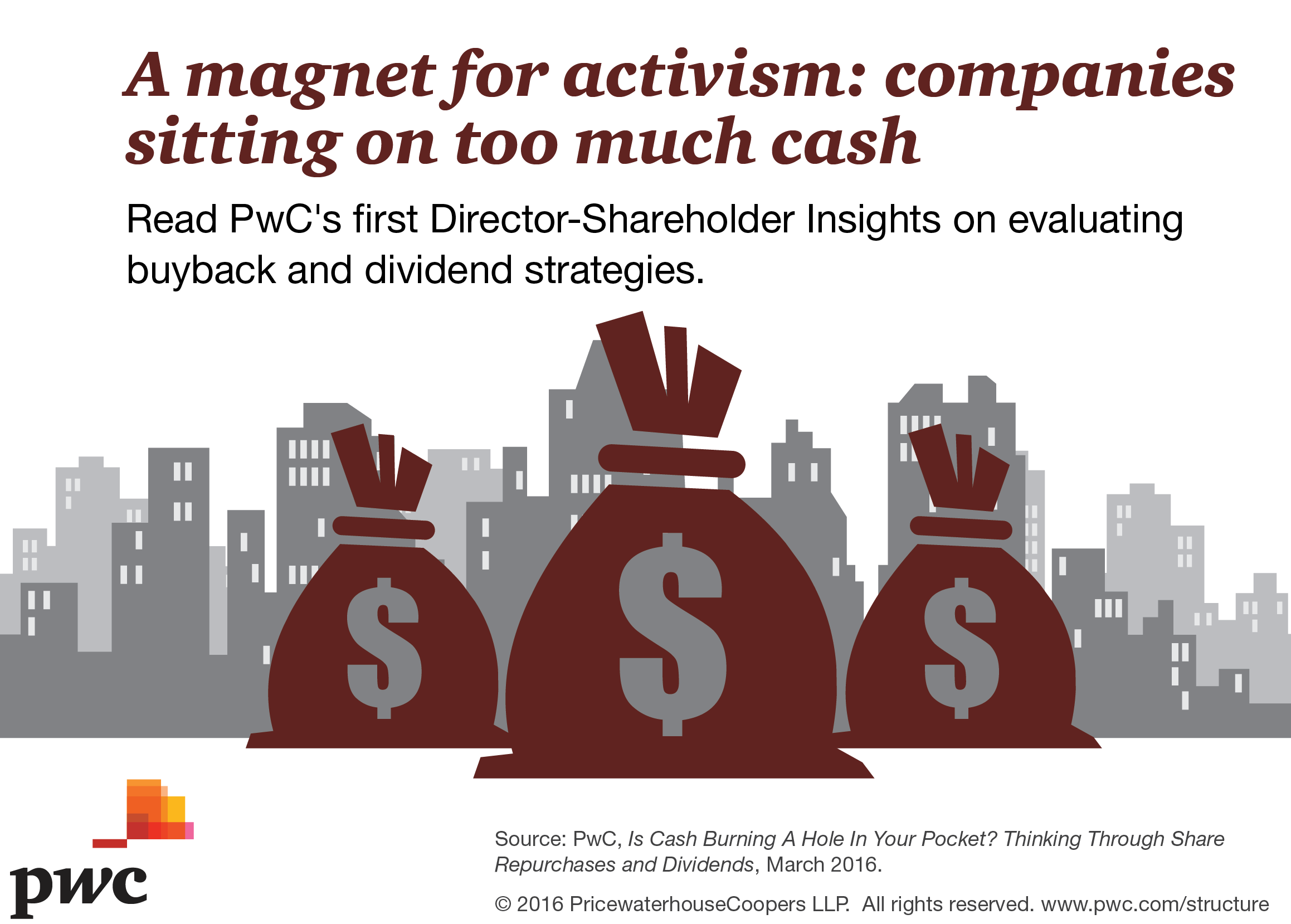
From PwC’s Governance Insights Center
Assessing your company’s capital allocation strategy: share repurchases and dividends
US companies are sitting on record levels of cash today. While this phenomenon indicates robust balance sheet health, it also raises questions about the best way to use this liquidity. And these situations stimulate provocative questions and discussions about the most prudent use of company resources–taking into account different stakeholders’ expectations, the company’s individual circumstances, and the overall economic environment. Ultimately, companies need an effective capital allocation strategy that is well thought-out, linked to their overall strategy, and clearly communicated. And a key element of this capital allocation strategy is whether, and/or how, cash is returned to shareholders
With more than $170 billion currently under activist management,[1] shareholder activism has shifted into high gear. Activists’ strategies typically involve pressuring companies to restructure, spin-off a division, sell the company, or return cash to shareholders through share repurchases or dividends. Companies targeted by activists increased spending on share repurchases and dividends to an average of 37% of operating cash flow in the first year after being approached—up from 22% the previous year.[2] Amid this pressure to improve short-term performance, it’s important for directors and shareholders to think about the potential impact share repurchases and dividends could have on the company’s ability to create long-term value.
Companies may adopt share repurchase plans for a variety of reasons: they think their shares may be undervalued by the market and want to signal confidence in the company’s future prospects. Share repurchases are also a way to offset the dilutive impact of shares issued in acquisitions. Repurchased shares can also be used to satisfy the shares needed upon exercise of employee stock options. The effect of these actions can allow a company to remunerate employees at a higher level with options by issuing more stock options without increasing the number of outstanding shares.
Companies may also choose to pay out dividends to their shareholders. Similarly, this signals management’s confidence in the company and its financial liquidity. Most (85%) of S&P 500 companies paid a regular quarterly dividend as of the end of September 2015, and 63% had raised their dividend from the previous quarter.[3] A decision to issue or modify a dividend payment speaks to whether the company believes it can maintain that dividend in the future.
Director and investor considerations
Directors and investors should be sure to understand the effect share repurchases and dividends might have on some of the company’s key performance metrics.
Directors and investors should also consider the company’s equity and debt structure, as well as the potentially adverse accounting and tax impact of returning cash to shareholders that would have to be repatriated from foreign jurisdictions.
For more insights, view PwC’s new whitepaper: Is cash burning a hole in your pocket? Thinking through share repurchases and dividends.
[1] Activist Insight Annual Review 2016.
[2] Vipal Monga, David Benoit and Theo Francis, “As Activism Rises, U.S. Firms Spend More on Buybacks Than Factories,” The Wall Street Journal, May 26, 2015, http://www.wsj.com/articles/companies-send-more-cash-back-to-shareholders-1432693805.
[3] Factset, Dividend Quarterly, December 16, 2015.
About PwC
At PwC, our purpose is to build trust in society and solve important problems. We’re a network of firms in 157 countries with more than 208,000 people who are committed to delivering quality in assurance, advisory and tax services. Find out more and tell us what matters to you by visiting us at www.pwc.com.
PwC refers to the PwC network and/or one or more of its member firms, each of which is a separate legal entity. Please see www.pwc.com/structure for further details.
© 2016 PwC. All rights reserved.